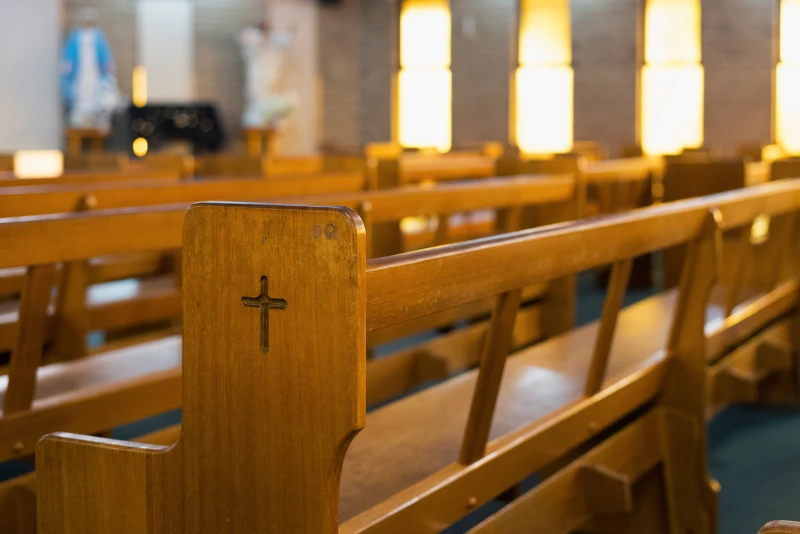




Washington, D.C. Newsroom, Dec 9, 2025 / 15:30 pm (CNA).
The number of American adults who identify with Christianity, with another religion, or with no religion have all remained steady, a new Pew Research Center report finds.
Surveys conducted since 2020 have generally found that about 70% of U.S. adults identify with a religion. The numbers have slightly fluctuated, but there has been no clear rise or fall in religious affiliation over the five-year period.
A Pew Research Center study, Religion Holds Steady in America, summarizes the latest trends in American religion and examines religion among young adults. The report is based on Pew’s National Public Opinion Reference Survey (NPORS), which has annually surveyed a random sample of U.S. adults since 2020. It also draws from the U.S. Religious Landscape Study (RLS), which surveyed 36,908 adults from July 17, 2023 to March 4, 2024.

The report also uses data from the General Social Survey and the American Time Use Survey.
The research revealed that after Pew found a decline in Christianity in the country from 2007 to 2020, the decline has halted and there is a stable presence of Christianty and religion in the nation.
While the polling shows no clear evidence of a religious increase among young adults, it did find that young men are now almost as religious as women in the same age group. The finding differs from past studies which found that young women tended to be more religious than young men.
This shift was found to be due to a decline in religiousness among American women, rather than an increase in the religiousness of men. In contrast to the young adults, the data revealed older women are more religious than older men.
Overall, young men and young women surveyed in 2023 and 2024 are less religious than those questioned in 2007 and 2014 studies.
In 2007, 54% of women and 40% of men ages 18 to 24 reported they prayed daily. Data from 2023-2024 revealed only 30% of women and 26% of men in the same age group said they pray daily, indicating the gender gap among religious men and women is closing.
The data found no evidence that any age group has become substantially more or less religious since 2020. In the 2025 NPORS, 83% of adults 71 or older identified with a religion, similarly to the 84% in 2020.
Among the youngest group of adults ages 18 to 30, 55% identify with a religion in 2025. This data is similar to the 57% who reported the same in 2020.
While there was not a large change in the number of adults who practice religion, older generations continue to be more religious than younger ones. Adults aged 71 or older tend to pray more than those ages 18 to 30, with 59% of older adults reporting they pray daily compared to 32% of young adults.
There were also discrepancies among age groups based on how often individuals attend religious services. Adults 71 and older attend the most with 43% reporting they attend at least monthly. Adults 31 to 40 were found to attend the least with 29% reporting they go monthly.
The data shows that today’s adults between the ages of roughly 18 and 22 are at least as religious as the age group slightly older than them who are in their mid to late 20s. Some aspects revealed that the younger U.S. adults may be more religious than the age group slightly older than them.
The 2023–24 RLS found 30% of adults born between 2003 and 2006 said they attended religious services at least once a month, which is higher than the 24% of people born between 1995 and 2002.
Read More

CNA Staff, Nov 4, 2025 / 06:30 am (CNA).
Catholic schools are faring much better in dioceses in which state-funded voucher programs are available for parents to use to pay school tuition, one researcher has found, though enrollment is still declining in most places.
John F. Quinn, a historian at Salve Regina University in Rhode Island, examined six Catholic dioceses over the last 16 years — three in states with voucher programs and three in states without them — and found that parochial schools are benefiting from vouchers.
He presented his research at the Society of Catholic Social Scientists’ annual conference at Franciscan University of Steubenville, Ohio, in October.
Quinn found that since 2009, the dioceses of Providence, Rhode Island; Fall River, Massachusetts; and Rockford, Illinois — none of which are located in states with voucher programs — have seen school closures and drops, some very large, in their parochial school enrollment.
Providence schools have seen a two-thirds drop, from 16,000 students in 2009 to about 10,000 in 2025, according to the historian.
The Diocese of Fall River, meanwhile, saw a 36% drop in enrollment, going from 7,800 students in 2009 to 5,000 in 2025. Rockford’s diocese saw a precipitous 52% drop, with 15,500 students in 2009 and 7,400 today. All three dioceses also saw multiple parochial school closures.
The numbers are very different in the dioceses in states that have voucher programs.
According to Quinn, the Archdiocese of Indianapolis only saw its enrollment numbers drop 3% since 2009. Nearly 23,000 were enrolled in its parochial schools in 2009, and the number stands at 22,300 today. The overall population of the archdiocese has also dropped 5% over the same time period, he noted.
Indiana’s Choice Scholarship Program was launched in 2011 and expanded to nearly all residents in 2025.
Two other dioceses, Orlando and Venice, are both in Florida, a state that approved its voucher program in 1999 and expanded it significantly in 2023.
The Diocese of Orlando has seen a 13% drop, going from 14,500 students in 2009 to 12,750 in 2025.
The Diocese of Venice, a relatively new one established in 1984, has seen a 52% increase in parish school enrollment since 2009 and growth in its number of parochial schools. In 2009, 4,400 students attended three high schools and 10 elementary schools, and today there are four high schools and 12 elementary schools with an enrollment of 6,800.
Quinn acknowledged that Florida has a growing population but said even taking that into account, the voucher programs have indisputably aided the Catholic schools there.
“We are full up with nearly every school at capacity,” Father John Belmonte, SJ, Diocese of Venice Superintendent of Catholic Education, said in September.
“America’s Catholic leaders have long seen parochial schools as critical to the well-being of the Church in America,” Quinn noted.
He recalled the Third Plenary Council of Baltimore in 1884, at which the bishops “called for every parish to have a school and for all Catholic parents to send their children” to them.
Quinn noted that pastors would sometimes build a parish school first before completing the church building.
In 1965, the high point of parochial school enrollment, 52% of American Catholic children, or 5.2 million students, were enrolled at 13,000 Catholic grammar and high schools.
Quinn cited the National Catholic Educational Association’s annual report, released in the spring, that showed just under 1.7 million students are currently enrolled in the nation’s current 8,500 parochial schools.
In 1965, nearly 70% of all parochial school teachers, or 115,607, were religious sisters, priests, or brothers, according to the Cardinal Newman Society.
By 1990, only 2.5% of parochial school faculty were priests or religious, and that number remains the same today.
Quinn said costs started rising as more lay teachers replaced religious and priests in the classroom.
Read More

Washington, D.C. Newsroom, Oct 31, 2025 / 14:53 pm (CNA).
The Illinois State Senate passed a bill to legalize physician-assisted suicide in the state.
The legislation (SB 1950), known as the “End-of-Life Options for Terminally Ill Patients Act,” would authorize medical aid in dying for terminally ill adults in Illinois if signed into law by Democrat Gov. J.B. Pritzker.
The House passed the bill in May 2025, and it stalled in the Senate during the regular session. It was taken up during the Fall veto session, and senators passed it early in the morning of Oct. 31. Pritzker will have 60 days to decide whether to sign or veto the bill before it automatically becomes law.
The bill would allow individuals to request and self-administer medication to end their lives. According to the bill, anyone requesting medically assisted suicide must be at least 18 years old, a resident of Illinois, and have a terminal disease with a prognosis of six months or less to live.
The bill also requires two verbal requests for the medication from the patient, with a five-day waiting period between the first and second request. The death certificates of individuals using physican-assisted suicide in the state would list the terminal disease as the cause of death, not suicide.
“Please continue to pray for vulnerable populations and for those who feel hopeless and are near end-of-life,” the Catholic Conference of Illinois, the public policy voice of the Catholic Church in the state, wrote in a post to the social media platform X.
“It is quite fitting that the forces of the culture of death in the Illinois General Assembly passed physician-assisted suicide on October 31—a day that, culturally, has become synonymous with glorifying death and evil,” said Bishop Thomas John Paprocki of the Diocese of Springfield in a statement. “It’s also ironic that these pro-death legislators did it under the cloud of darkness at 2:54 a.m.”
“Doctors take an oath to do no harm. Now, they can prescribe death. There are documented cases of patients being denied treatment and instead offered life-ending drugs,” Paprocki said. “Individuals could also be coerced into taking the lethal drug.”
The bishop called for prayers for Pritzker to reject the legislation as “physician assisted suicide undermines the value of each person, especially the vulnerable, the poor, and those with disabilities.”
The anti-assisted suicide group Patients Rights Action Fund called on Pritzker to veto the legislation.
“We encourage lawmakers to instead prioritize expanding access to mental health services, hospice care, and palliative support,” the advocacy group said in a statement. “Every patient deserves compassionate care and a full spectrum of options to live with dignity. The passage of SB 1950 introducing the use of lethal drugs in Illinois compromises that fundamental right. “
Cardinal Blase Cupich, the archbishop of Chicago, strongly criticized the bill in May after it passed the House.
“I speak to this topic not only as a religious leader but also as one who has seen a parent die from a debilitating illness,” Cupich said, recalling his father’s death. Cupich urged Illinois to promote “compassionate care,” not assisted suicide.
“There is a way to both honor the dignity of human life and provide compassionate care to those experiencing life-ending illness,” Cupich said. “Surely the Illinois Legislature should explore those options before making suicide one of the avenues available to the ill and distressed.”
The Catholic Conference of Illinois also asked the governor to veto the bill and improve palliative care programs “that offer expert assessment and management of pain and other symptoms.”
“The Illinois General Assembly has put our state on a slippery path that jeopardizes the well-being of the poor and marginalized, especially those in the disability community and have foreseeable tragic consequences,” the conference said in a statement.
Read More

The Sun blew out a coronal mass ejection along with part of a solar filament over a three-hour period on Feb. 24, 2015. While some of the strands fell back into the Sun, a substantial part raced into space in a bright cloud of particles (as observed by the NASA-ESA Solar and Heliospheric Observatory spacecraft). Because this occurred way over near the edge of the Sun, it was unlikely to have any effect on Earth.
Read More